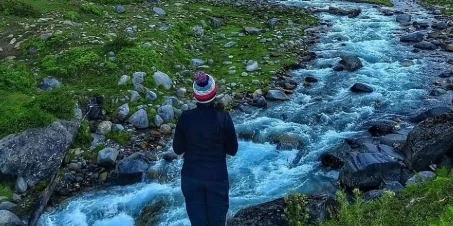
Eco-trekking is sustainable and eco-friendly trekking with minimal interference in nature so that maximum respect can be accorded to the natural and cultural heritage of the region. Unlike traditional trekking, which, in some regions, is the reason for deterioration in nature due to litter, uncontrolled footprints, and misuse of facilities for waste disposal, eco-trekking encourages responsible tourism. Eco-trekking philosophy is that a "leave no trace" implies that the ecological balance of routes traversed is not disturbed in any way. Eco-trekking promotes the use of eco-friendly gear, biodegradable products, and waste disposal systems such as using refillable containers, resisting plastic bins, and proper disposal of garbage. Eco-trekking promotes low group sizes in an attempt to prevent effects on natural trails and host resources. Eco-trekking promotes local people through local guide employment, camping in eco-lodges or homestays, and buying local produce and food, hence promoting sustainable tourism.Such trekking also provides a scope for the tourists to touch nature and the indigenous people. The trekkers get exposure to the diversity, conservation, and indigenous life of the region, and they become sensitive and considerate. Through choosing eco-trekking, the tourists are supporting an expanded campaign of protecting natural habitats, wildlife rescue, and assisting indigenous peoples. With a world increasingly scarred by more and more destroyed natural environments due to global warming and mass tourism, eco-trekking provides an environmentally friendly option. It merges conservation with travel so that human beings can derive the beauty of nature without endangering the environment. Whether ascending mountain paths, trekking deep into dense forest, or climbing far into secluded villages, eco-trekking leaves these for future generations to enjoy. It is not just a means of getting there, no, it is a pledge to the planet.Why Eco-Trekking MattersEco-trekking matters because it provides a pollution-free means of experiencing nature without destroying it for future generations. The more tourism, the larger portion of the natural world has the potential to be drained by pollution, habitat loss, and resource consumption. Eco-trekking opposes these occurrences by promoting low-impact, eco-friendly touring behaviours. By adhering to the "leave no trace" principles, eco-trekkers assist in preventing littering, erosion of the soil, and wildlife disturbance and thus preserve fragile ecosystems.1. Minimise Environmental FootprintEco-trekking is all about minimising one's environmental footprint when exploring nature. Trekkers adopt environmentally friendly habits such as carrying water bottles and avoiding single-use plastic, trekking on paths so as not to destroy the ground, and throwing away litter in the right way. By adopting the "leave no trace" ethos, environmentally conscious trekkers ensure biodiversity, minimise pollution, and contribute to the overall health of sensitive ecosystems. All these little things put together do a lot to save the environment.2. Benefit Local CommunitiesOne of the principles of eco-trekking is to reward local communities so that trekking trails generate revenues. This would involve the use of local guides, overnight trekking in homestays or ecotourist accommodations, and shopping and purchasing crafts from locals. These are real dividends to the community economy and culture preservation. Where aboriginal locals are granted economic benefits for them to enjoy their native environment preserved, they will increasingly know they like and engage in eco-trekking activities.3. Save Natural BeautyEco-trekking is also a necessary process of keeping the trekking sites natural in their raw state, in top form and beauty. By refraining from environmentally damaging practices like littering, tree cutting, or provoking wildlife, eco-trekkers make sure that future travellers can also have the same unblemished beauty to enjoy. Eco-trekking also involves heightening public consciousness regarding maintaining the environment intact and unharmed, which gets people involved in saving and conserving nature. Maintaining a presentable landscape appearance not only increases tourism but also keeps the ecological equilibrium responsible for supporting all forms of life.How to Trek SensiblyResponsible trekking is enjoying nature without harming the environment too much and being sensitive to people and society around you. Here are some easy ways to make sure your trekking adventures are sustainable and ethical:Follow "Leave No Trace" Principles: Take your trash with you, do not disturb animals, and stay on trails to avoid soil erosion and habitat destruction. Leave things like you saw them at first sight, untouched and undisturbed.Practice Using Reusable Gear: Use refillable water bottles, reusable bags, and biodegradable toiletries. Avoid single-use plastic and non-biodegradable items that can end up littering the trail and harming wildlife.Be Considerate of the Local Culture and Traditions: Be respectful of villages or rural, request permission for taking a picture, and also be courteous to the locals. Greet a few local terms it is considerate and makes a loving bond.Economically Support the Locals: Use local guides and porters, locally owned lodges or homestays, and purchase local products. This ensures that the host's economy remains and contributes to sustainable tourism.Travel in Small Groups: Group members are a drain on resources and disturb the environment. Small groups have a smaller ecological impact and produce more intense, low-impact travel experiences.Avoid Campfires and Crowded Trails: Use environmentally friendly cooking equipment rather than open fires, which harm forest floors and are wildfire hazards. Take off-the-beaten-path trails whenever possible to avoid putting pressure on crowded trails.Educate Yourself and Others: Find out about the region's biodiversity, history, and environmental concerns before you trek there. Spread awareness to get others to trek responsibly as well.Respect Wildlife: Being respectful to wildlife is a culture of responsible trekking. Remember, as you move into animal enclosures, you are visiting the animal's residence. Watch animals from distances suitable for observers to enable the animal to conduct its natural activity without stress or causing injury, and so that their actions are not hampered in any way. Don't feed, touch, or follow wildlife because this will violate their environment and be harmful to you as well as to the animal.Advantages of Opting for Eco-Trekking ToursEco-trekking is a recent and rewarding way of moving about in nature responsibly. It is not just an adventure; it has some benefits for nature too, and also for you. Some of the benefits of opting for eco-trekking are as follows:Conservation of the Environment: Eco-trekking also minimises your eco-print through sustainable means like staying away from plastics, only going wherever there is a trail, and never taking anything home. It saves sensitive ecosystems, wildlife, and natural resources for future times.Supporting the Community: Through its activities such as lodging in eco-lodges, engaging the local guide services, and purchasing handicraft products from the locale, eco-trekking acts in a direct positive way to benefit the visiting community. Eco-trekking ensures job opportunities, cross-cultural contacts, and local economies get preserved sustainably.More Exposure to Nature: Eco-trekking exposes tourists to an ecologically sensitive and conscious mind. It includes acquiring knowledge about biodiversity, conservation, and ecological issues at the destination spot, and hence, a more natural tour experience.Health and Welfare: Walking is an excellent physical exercise, and eco-trekking in pristine natural surroundings has psychological and emotional advantages too. Eco-trekking can shift you away from dirty, populated areas to calm and picturesque regions, thereby being beneficial to health overall.Education and Awareness: Eco-trekking fosters the appreciation of environmental status and an environmentally friendly lifestyle. The guides have an inherent incentive to come back with enhanced ecological sensitivity and enhanced responsibility for nature's conservation at their home place as well.Long-Term Sustainability of Travel: Eco-trekking as a sustainable alternative preserves the naturalness and wonder of trekking sites. It renders tourism long-term sustainable and affordable without contaminating the environment or destroying indigenous cultures.Why Book with escape2exploreWhen exploring the Treks in Karnataka and beyond, escape2explore stands out as a trusted name in adventure and experiential travel. Here’s why hundreds of travellers choose us for their getaways:Trusted, Well-Reviewed Local Operator: escape2explore has gained the trust of thousands of content tourists all over India. With persistent positive feedback and an unblemished reputation for delivering quality experiences, we assure your experience to be hassle-free, memorable, and value-packed. Our insider local knowledge guarantees that you to always be in safe hands.Seasoned Guides: Our trips are led by friendly, trained, and professional guides who are passionate about the outdoors and your safety. Whether it's a beach trek, a cultural tour, or a spiritual walk through temples, our team knows the terrain, the stories, and how to make each moment count.Safe & Curated Itineraries: Your safety is our number one priority. Each of our tour packages is thoughtfully crafted with safety measures, researched accommodations, and easy travel arrangements. We take care of the details so you can have the experience hassle-free and worry-free.Unique Experience That You Won't Find Anywhere Else: With escape2explore, you discover more than the tourist attractions. We go off the beaten track with hidden beaches, unusual treks, offbeat cultural destinations, and true interactions. Whether camping out beneath the stars or exploring a hidden beach cove, we present to you the other side of Coorg that not many get to encounter.Read: AMK|Andharban Jungle|Sandhan Valley|Maharashtra Experinece|Tikona Fort


